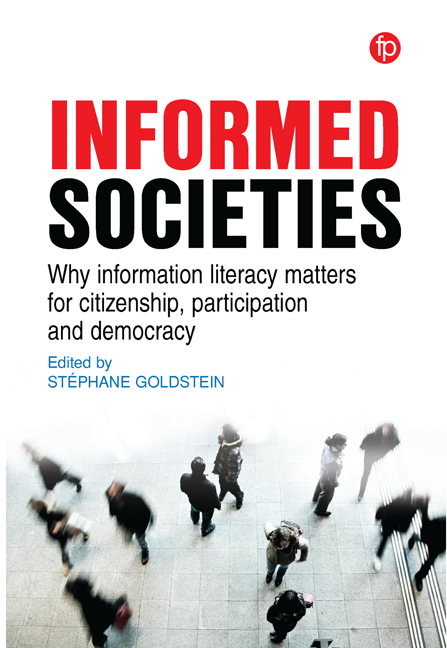Book contents
- Frontmatter
- Contents
- Figures and Tables
- Notes on the authors
- Foreword
- Introduction
- 1 Information Literacy in the Digital Age: Why Critical Digital Literacy Matters for Democracy
- 2 The Discourses of Power, Information and Literacy
- 3 What Intellectual Empathy Can Offer Information Literacy Education
- 4 The ‘Post-Truth’ World, Misinformation, and Information Literacy: a Perspective From Cognitive Science
- 5 Media and Information Literacy: Intersection and Evolution, a Brief History
- 6 Information Literacy and National Policy Making
- 7 Information Literacy as a Growth Pillar for a Fledgling Democracy
- 8 Information literacy and the Societal Imperative of Information Discernment
- 9 Libraries and Democracy: Complementarity in a Regime of Truth
- 10 Scottish Public Libraries Welcome Syrian New Scots: a Transition from Being a Refugee to Becoming an Active Part of the Community
- 11 Information Literacy, Lifelong Learning and the Needs of an Ageing Population
- Index
2 - The Discourses of Power, Information and Literacy
Published online by Cambridge University Press: 22 February 2020
- Frontmatter
- Contents
- Figures and Tables
- Notes on the authors
- Foreword
- Introduction
- 1 Information Literacy in the Digital Age: Why Critical Digital Literacy Matters for Democracy
- 2 The Discourses of Power, Information and Literacy
- 3 What Intellectual Empathy Can Offer Information Literacy Education
- 4 The ‘Post-Truth’ World, Misinformation, and Information Literacy: a Perspective From Cognitive Science
- 5 Media and Information Literacy: Intersection and Evolution, a Brief History
- 6 Information Literacy and National Policy Making
- 7 Information Literacy as a Growth Pillar for a Fledgling Democracy
- 8 Information literacy and the Societal Imperative of Information Discernment
- 9 Libraries and Democracy: Complementarity in a Regime of Truth
- 10 Scottish Public Libraries Welcome Syrian New Scots: a Transition from Being a Refugee to Becoming an Active Part of the Community
- 11 Information Literacy, Lifelong Learning and the Needs of an Ageing Population
- Index
Summary
This book as a whole is concerned with the notion that information and, by extension, information literacy (IL) are political: more precisely, that information and IL are enmeshed in formal and informal decision-making systems that determine the distribution of capital, human rights, public benefits and so on. From the work of Bell (1976), through Castells (1996) and other analyses of the ‘information society’ (see Webster, 2014 for a review), these issues are considered most frequently at the global, macro level. Discussions of information literacy in respect to such macro-political and economic matters are rarer, but the gap is partly filled by the preceding chapter, and others that follow in this collection.
Befitting the common conception of IL as an attribute of individuals and communities, the focus of this chapter is on micro-politics: that is, the relations of power, authority and inequality that stem from everyday language and discourse. The aim is to explore how information and IL underpin political processes at this micro-level, and how dialogue, interaction and the making of judgements about information operate within information landscapes (Lloyd, 2010) that are shaped and stratified by power and authority of various kinds. This is accomplished by investigating the critical political theories of authors including Jürgen Habermas, Mikhail Bakhtin and Michel Foucault to gain insight into the ways in which IL can be applied in challenges to power and authority structures – but how it also may become part of these structures.
Politics and information
The earliest philosophers recognised the importance of applying knowledge and information to political decisions. Socrates ‘preached insistently that knowledge ought to be applied to conduct in the same way as it was already applied with such success to carpentry, shoemaking or medicine’ (Lindsay, 1906, xii). In Book VII of The Republic Plato argues to Glaucon that public affairs should never be conducted only by ‘men who are poor and hungry for goods of their own’ (ibid., 214) as, motivated only by self-interest, they would lack the wisdom and skill to take effective decisions. Plato would ‘persuade those who are to share in the highest affairs of the city to take to calculation, and embrace it in no amateur spirit … until they arrive by the help of sheer intelligence at a vision of the nature of numbers’ (ibid., 219).
- Type
- Chapter
- Information
- Informed SocietiesWhy information literacy matters for citizenship, participation and democracy, pp. 25 - 46Publisher: FacetPrint publication year: 2019
- 1
- Cited by



